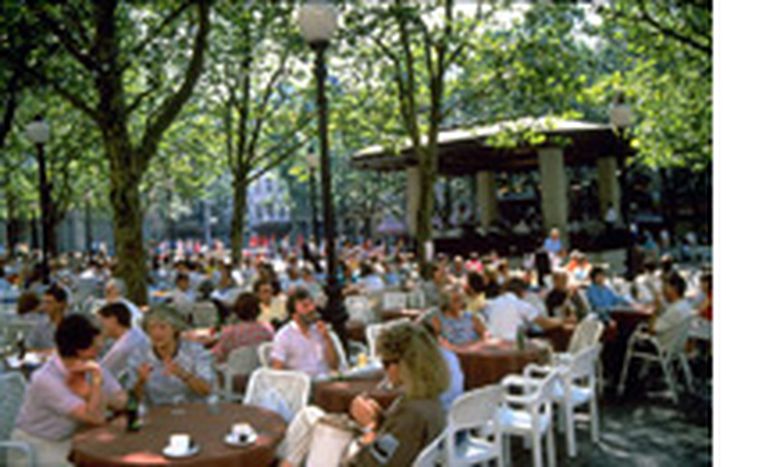
Luxemburg: three languages, one nation
Published on
Translation by:
 ingrid su
ingrid su
It is not easy to establish a national identity when foreigners make up 38% of a country’s population, especially when it is a country that has to sit between France and Germany. However, sometimes a small country can teach the European Union a wonderful lesson on integration.
Wedged between France, Germany and Belgium, this handkerchief-shaped land called Luxembourg is most famous for being a fiscal paradise. But, by walking through the streets in the homonymic capital, you will realize that there is a dynamic and multifaceted nation concealed behind its high standard of living – a nation that is constantly searching its own identity.
39% of foreign residents - and the number is still rising
39% of Luxembourg’s half million people are foreigners, so how should we explain that this remains an absolute record in the European Union? The very history of the Grand Duchy of Luxembourg speaks for itself. Luxembourg was founded in 963, and survived French, Prussian, Belgian and Dutch rule, until it finally gained independence in 1839. But that is not all. In 1952, Luxembourg was one of the founding members of the European Coal and Steel Community. The ECSC had its headquarters in the Grand Duchy, but in 2002, the EU took over the responsibility of the Community. Nowadays Luxembourg still hosts the European Court of Justice and the European Court of Auditors, in addition to several offices of the European Commission and the translation services of the Parliament. This European dimension also contributes to the increase of foreigners.
German, French... and Luxembourgish
As the Prime Minsiter, Jean Claude Juncker, stated to cafebabel.com: "When you live in a little country and your French and German neighbors refuse to speak your wonderful language, you only have one option: to speak their language." Is it possible to have a ‘national spirit’ in a country where foreigners have been integrated into the population for centuries? “The national conscience of the people in Luxembourg emerged after the Second World War. It is particularly strong today, especially among older people and residents of the countryside. It is demonstrated through their attachment to the Luxembourgish language,” confides Gerald, an Irish translator who has been living in Luxembourg for 10 years. It is true that language plays the central role in the national identity of Luxembourgers. In 1941, the Nazi-occupiers held a ‘fake’ referendum in which every Luxembourger had to declare whether their nationality, mother tongue and ethnic origins were German or French. 90% of the population said Luxembourgish, a language with West-Germanic origins. The Nazis failed, and the Luxembourgish 'resistance' were victorious. This was the beginning of national identification. In 1984, a legislation finally raised the status of Luxembourgish to one of the official languages, and founded the trilingual policy that is still in effect today. The presence of these three languages is the keystone in the relations between the ‘pure’ Luxembourgers and the foreigners residing in the country. If French and German are indeed the languages of administration and communication between natives and foreigners, then Luxembourgish represents the distinctive mark of national identity, perhaps even the only one. It suffices to think that certified knowledge of this language is part of the fundamental requirements to obtain the citizenship of Luxembourg.
”Integration is not the same as fusion”
Nevertheless, a language cannot represent a factor of discrimination. For this, the government of Luxembourg has enforced an exemplary policy of social advancement, offering courses of Luxembourgish to foreign citizens, and special assistance to new immigrant children in schools. However, the efforts for integration are not only aimed at foreigners. The multilingual and multicultural education strategy in schools in Luxembourg represents a factor of cohesion aimed at all generations. It is a symptom of a country that is open to receive foreigners, while assuring them that everyone can maintain their own national identity. “The Portuguese are the largest immigrant group in Luxembourg and they have now been integrated into the society. Yet we continue to maintain our traditions and our identity. Integration is not synonymous to fusion of cultures,” says Claudia, who is originally from Lisbon, but has been working as a translator at the Translation Centre for the Bodies of the European Union in Luxembourg for 8 years.
Perhaps the European Union can get some inspiration from the story of this small country to develop a model that will increase cohesion and understanding between countries. The rest has been stated by the most famous Luxembourger and the father of Europe,
Robert Schuman, “Once nationalism has been conquered, it will be necessary to find new ways of uniting Europe.”
Translated from Lussemburgo: tre lingue, una nazione


